人教九年级 Unit 12 Life is full of the unexpectedSection A (3a-4c)课件(共29张PPT)
文档属性
| 名称 | 人教九年级 Unit 12 Life is full of the unexpectedSection A (3a-4c)课件(共29张PPT) | 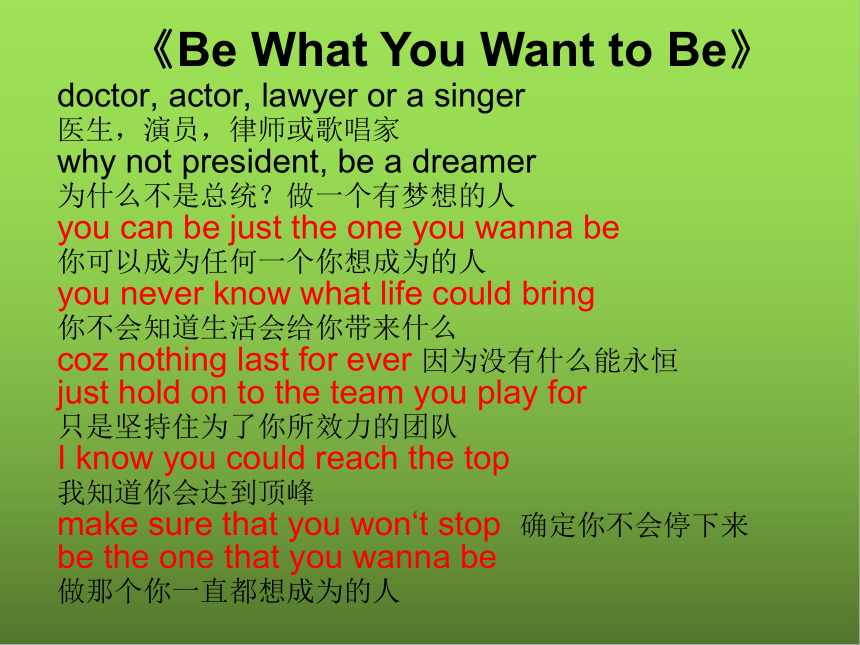 | |
| 格式 | zip | ||
| 文件大小 | 2.6MB | ||
| 资源类型 | 教案 | ||
| 版本资源 | 人教新目标(Go for it)版 | ||
| 科目 | 英语 | ||
| 更新时间 | 2020-02-25 19:25:14 | ||
图片预览

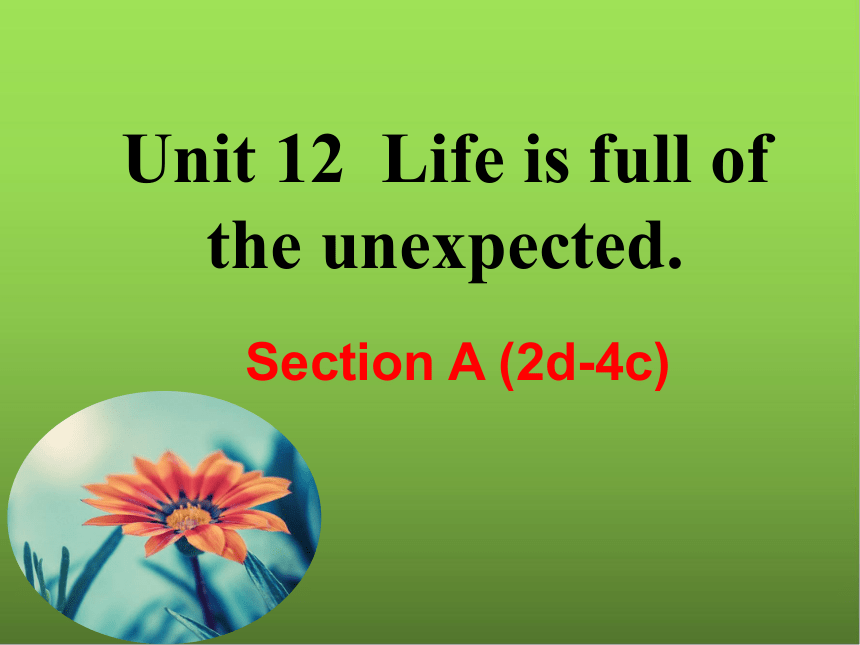
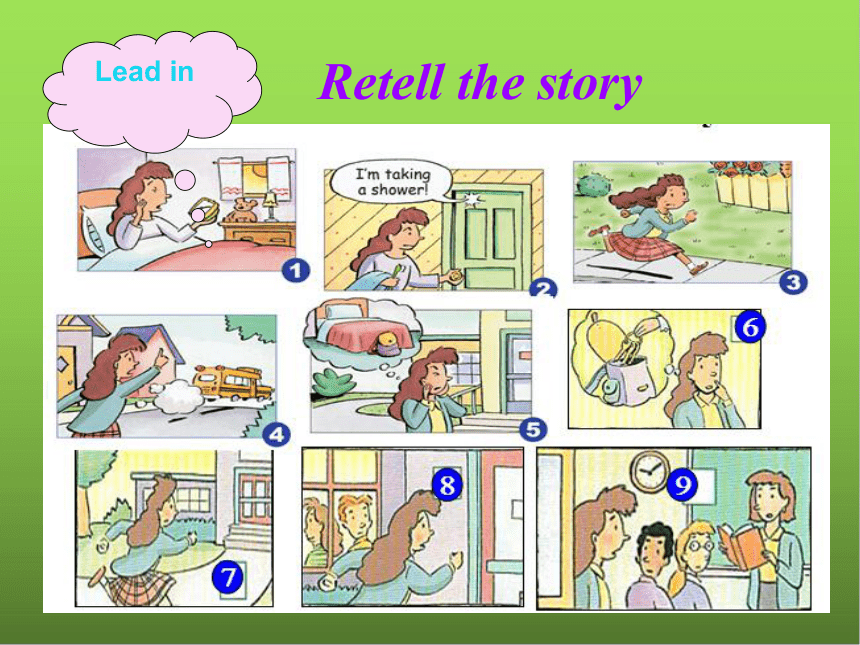


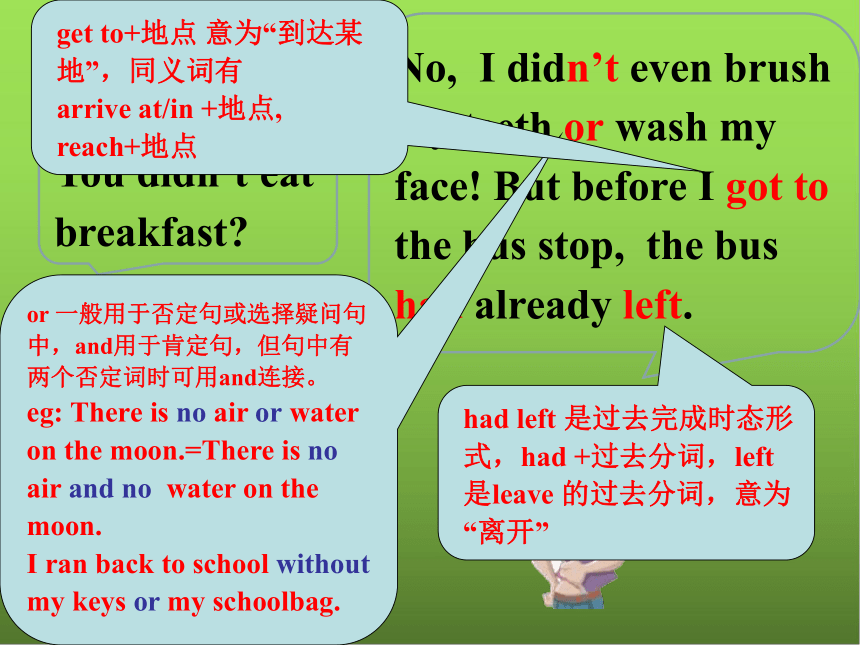

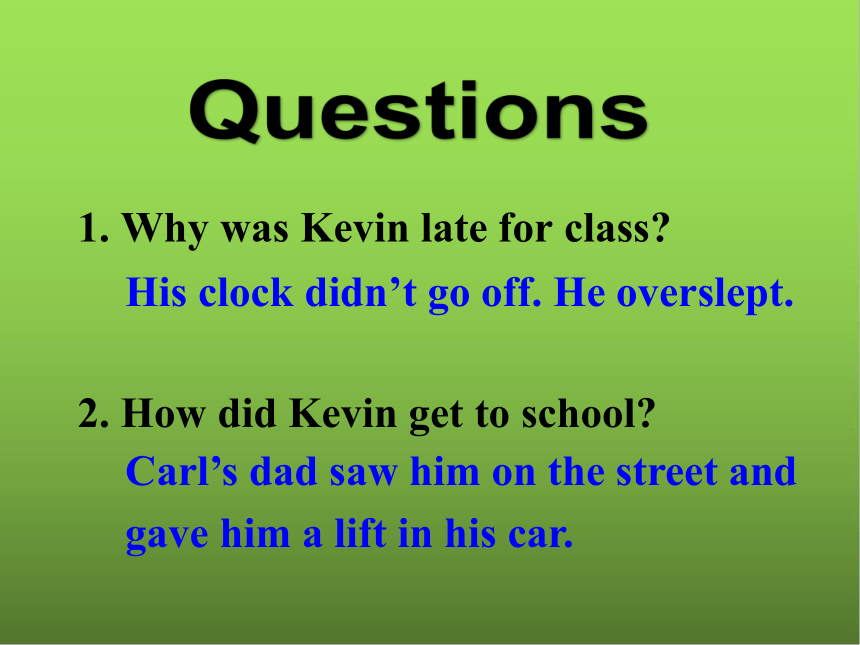
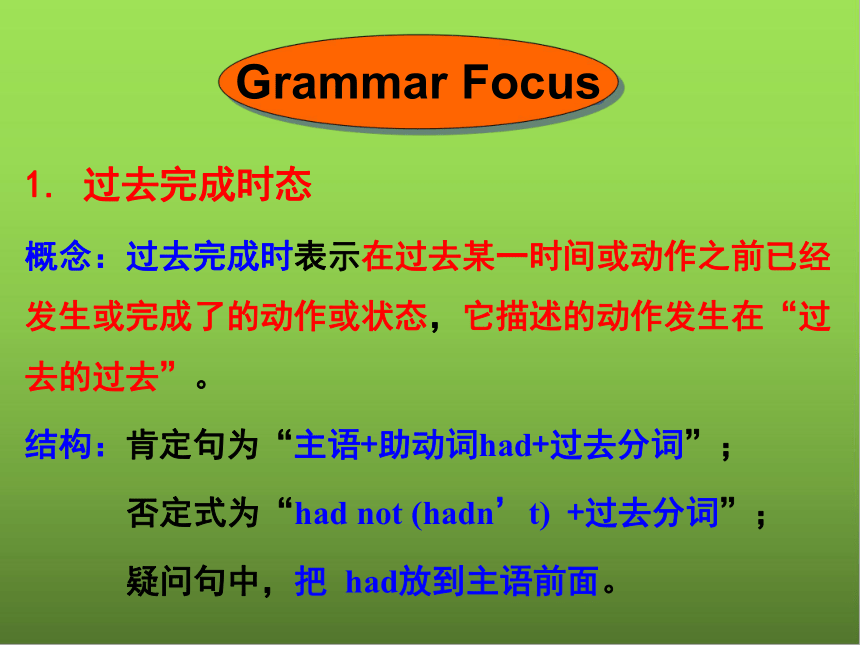
文档简介
(共29张PPT)
doctor, actor, lawyer or a singer
医生,演员,律师或歌唱家
why not president, be a dreamer
为什么不是总统?做一个有梦想的人
you can be just the one you wanna be
你可以成为任何一个你想成为的人
you never know what life could bring
你不会知道生活会给你带来什么
coz nothing last for ever 因为没有什么能永恒
just hold on to the team you play for
只是坚持住为了你所效力的团队
I know you could reach the top
我知道你会达到顶峰
make sure that you won‘t stop 确定你不会停下来
be the one that you wanna be
做那个你一直都想成为的人
《Be What You Want to Be》
Unit 12 Life is full of
the unexpected.
Section A (2d-4c)
Retell the story
Lead in
2d
Role-play the conversation.
Why were you late for class today, Kevin?
My alarm clock didn’t go off! I kept sleeping, and when I woke up, it was already 8:00 a.m.!
go off 为动词短语, 意为(闹钟)响,也可以表示(质量)变坏;(灯)熄灭;(水、电)断掉。
eg:Milk goes off quickly in hot weather.
牛奶在热天很快就变质了。
late (adj.) 迟的 ; later 后来;
the latest news 最新的消息 ;
lately (adv.) 最近 =recently
1.keep doing?一直做某事?
2.keep...doing 让...一直做某事
3.keep+ adj.?保持... (eg: keep quiet)
4. keep?.... +adj.?让...保持...
(eg:keep the dog quiet)
5.keep...from?doing 阻止...做某事?
wake up 醒来,叫醒
wake sb. up 叫醒某人
wake,woke,woken
Oh, no!
So I just quickly put on some clothes and rushed out of the door.
put on +宾语 ,意为“穿上...”;反义词 take off “脱下;起飞 ”
be/get dressed 后面不能接宾语, 意为 “穿好衣服”,
be/get dressed in +衣服/颜色 , 意为“穿上...”
rush out of 从…冲出去, 冲出...
e.g. Henry rushed out of the room and disappeared in the rain.
亨利冲出房间, 消失在了雨中。
rush to do sth. 匆忙做某事
rush hour (交通)高峰时段
You didn’t eat breakfast?
No, I didn’t even brush my teeth or wash my face! But before I got to the bus stop, the bus had already left.
or 一般用于否定句或选择疑问句中,and用于肯定句,但句中有两个否定词时可用and连接。
eg: There is no air or water on the moon.=There is no air and no water on the moon.
I ran back to school without my keys or my schoolbag.
had left 是过去完成时态形式,had +过去分词,left 是leave 的过去分词,意为“离开”
get to+地点 意为“到达某地”,同义词有
arrive at/in +地点,
reach+地点
Then how did you get here?
Luckily, Carl’s dad saw me on the street and gave me a lift in his car.
Well, at least by the time you got to school, you were only five minutes late for class.
give…a lift 意为“捎(某人)一程,让某人搭车 ”,同give…a ride
eg: My bike is broken.Could you give me a lift to school?
lift v. 抬高,举起;n. 电梯;搭便车
at least 意为“至少”。
at most 意为“最多”
by the time意为“在……以前”
luck (n.)“幸运”,Good luck! lucky(adj.),“幸运的” ,反义词unlucky; luckily (adv.),“幸运地” 反义词unluckily
1. Why was Kevin late for class?
2. How did Kevin get to school?
His clock didn’t go off. He overslept.
Carl’s dad saw him on the street and gave him a lift in his car.
Questions
1. 过去完成时态
概念:过去完成时表示在过去某一时间或动作之前已经发生或完成了的动作或状态,它描述的动作发生在“过去的过去”。
结构:肯定句为“主语+助动词had+过去分词”;
否定式为“had not (hadn’t) +过去分词”;
疑问句中,把 had放到主语前面。
Grammar Focus
2. by the time
意为在……以前,近似于before,常引导时间状语从句用一般过去时态,主句常用过去完成时。
eg:By the time you came back, I had finished this book.
你回来时我已经把这本书看完了。
(从句谓语动词came back 为一般过去时, 所以主句 动作用过去完成时had finished, 表示过去的过去。)
3. by the end of +时间点意为“在...结束时”
(1) +过去的时间点, 主句用过去完成时;
例:By the end of last year, I had stayed in Xi’an for seven years. 在去年结束时, 我已经在西安待了七年了。
(2) +将来的时间点, 主句用一般将来时或将来完成时;
例:By the end of next month, I will finish/have finished my new book.
在下个月结束时,我将(已)完成我的新书了。
(3) +现在的时间点, 主句用现在完成时, 。
例: By the end of this month,I have finished my new book. 在这个月结束时,我已完成我的新书了。
拓展
1. Tim went into the bathroom.
Mary got up.
____________________________________________________________________
2. The coffee became cold.
I put cream( 奶油,乳脂)in the coffee.
____________________________________________________________________
Make sentences using by the
time or before.
By the time Mary got up, Tim had already gone into the bathroom.
Before I put cream in the coffee, the coffee had become cold.
4a
3.The teacher collected(收集) the math homework.
I got to school.
_____________________________________
_____________________________________
4. I completed(完成)the work for my boss(老板).
The workday(工作日) ended.
_____________________________________
_____________________________________
By the time I got to school, the teacher had collected the math homework.
By the time the workday ended, I had completed the work for my boss.
5. The movie started.
I arrived at the cinema.
_________________________________
_________________________________
6.My mother finished making the apple pie(馅饼).
I got home from my language course(语 言课).
__________________________________
__________________________________________________________________
By the time I arrived at the cinema, the movie had started.
By the time I got home from my language course, my mother had finished making the apple pie.
By the time I arrived at the party, everyone else(其余的)_______ already _________ .
2.When he put the noodles into a bowl, he realized (认识到)he _____________to add the green beans(豆,豆荚).
Fill in the blanks with the correct
forms of the words in the box.
rush out forget arrive at go into show up(露面,赶到) find out
had
shown up
had forgotten
4b
forget, forgot, forgotten 忘记
forget to do sth.忘记做某事(事未做)
forget doing sth.忘记做某事(事已做)
arrive at/in +地点,意为“ 到达”
同义词:get to,reach
show showed shown (v. ) ;show off 炫耀;
show sb. around 带某人四处看看
on show (n.) 在展览中 ;TV/talk/talent/fashion/trade show(n.)
电视/访谈/才艺/时装/贸易节目/表演/展览)
find意为“找到;发现”,强调找的结果
find out 意为“查出;获知;弄清楚”,强调经过研究、调查而得
else一般用在所有由 any-,every-,some-,no-开头和由-body,-one,-thing,-where结尾的不定代词后面;
也可放在疑问代词who,what,which,when, where, how等后面,常用来作后置定语
Add some salt to the soup. 加点盐到汤里。
His illness added to his family's trouble.他的病增添了他家的负担。
The?costs?added?up?to?1000?dollars.?费用总计为1000美元。
Add up all the numbers, you can get 100. 加上所有的数字,你可得100.
By the time my mother came back from
the market (市场), I already_______
______ ___ of the door to go to my piano lesson.
4. Before she got to the airport, she
_____________ about the earthquake.
5. When she __________ the movie theater, she remembered she had forgotten to feed her dog.
6. Before she got a chance to say goodbye, he ____________ the building.
rushed out
had found out
arrived at
had gone into
had
feed表示“用食物喂某人或动物”,通常用 feed sth to sb 或 feed sb on/with sth。
have/get a chance to do/of doing sth. 有机会做某事
take the chance 把握机会; miss the chance 失去机会
by chance /accident 碰巧,偶然
By the time I left for school in the morning, _____________________________________.
By the end of the school day, ________________________________.
By dinner time, I _____________________.
Write two true statements and one false statement about your yesterday. Then ask your classmates to guess the false statement.
4c
I saw my mother clean my room
I have started missing my schoolmates
ate some fish
had seen
leave for 动身去...
Summary
Key words & phrases:
go off ,oversleep(overslept), wake up, rush out of, give…a lift, show up, cream,bean, market, by the time (that),by the end of, keep, at least, leave for, find out, forget, add, else, chance, feed
Key sentence structure:
过去完成时态:主语+助动词had+过去分词
eg: By the time I got to the bus stop, the bus had already left.
Life is always full of the
unexpected and enjoyable !
Let's enjoy it!
1. 口头作业 (Oral work)
读、背、理解 new words and expressions in Unit12 Section A;
熟读 Unit 12 Section A (2d)
2. 书面作业 (Writing work)
学练优 Unit 12 Section A
第二课时
Homework
Thanks for your attention!
Exercises
doctor, actor, lawyer or a singer
医生,演员,律师或歌唱家
why not president, be a dreamer
为什么不是总统?做一个有梦想的人
you can be just the one you wanna be
你可以成为任何一个你想成为的人
you never know what life could bring
你不会知道生活会给你带来什么
coz nothing last for ever 因为没有什么能永恒
just hold on to the team you play for
只是坚持住为了你所效力的团队
I know you could reach the top
我知道你会达到顶峰
make sure that you won‘t stop 确定你不会停下来
be the one that you wanna be
做那个你一直都想成为的人
《Be What You Want to Be》
Unit 12 Life is full of
the unexpected.
Section A (2d-4c)
Retell the story
Lead in
2d
Role-play the conversation.
Why were you late for class today, Kevin?
My alarm clock didn’t go off! I kept sleeping, and when I woke up, it was already 8:00 a.m.!
go off 为动词短语, 意为(闹钟)响,也可以表示(质量)变坏;(灯)熄灭;(水、电)断掉。
eg:Milk goes off quickly in hot weather.
牛奶在热天很快就变质了。
late (adj.) 迟的 ; later 后来;
the latest news 最新的消息 ;
lately (adv.) 最近 =recently
1.keep doing?一直做某事?
2.keep...doing 让...一直做某事
3.keep+ adj.?保持... (eg: keep quiet)
4. keep?.... +adj.?让...保持...
(eg:keep the dog quiet)
5.keep...from?doing 阻止...做某事?
wake up 醒来,叫醒
wake sb. up 叫醒某人
wake,woke,woken
Oh, no!
So I just quickly put on some clothes and rushed out of the door.
put on +宾语 ,意为“穿上...”;反义词 take off “脱下;起飞 ”
be/get dressed 后面不能接宾语, 意为 “穿好衣服”,
be/get dressed in +衣服/颜色 , 意为“穿上...”
rush out of 从…冲出去, 冲出...
e.g. Henry rushed out of the room and disappeared in the rain.
亨利冲出房间, 消失在了雨中。
rush to do sth. 匆忙做某事
rush hour (交通)高峰时段
You didn’t eat breakfast?
No, I didn’t even brush my teeth or wash my face! But before I got to the bus stop, the bus had already left.
or 一般用于否定句或选择疑问句中,and用于肯定句,但句中有两个否定词时可用and连接。
eg: There is no air or water on the moon.=There is no air and no water on the moon.
I ran back to school without my keys or my schoolbag.
had left 是过去完成时态形式,had +过去分词,left 是leave 的过去分词,意为“离开”
get to+地点 意为“到达某地”,同义词有
arrive at/in +地点,
reach+地点
Then how did you get here?
Luckily, Carl’s dad saw me on the street and gave me a lift in his car.
Well, at least by the time you got to school, you were only five minutes late for class.
give…a lift 意为“捎(某人)一程,让某人搭车 ”,同give…a ride
eg: My bike is broken.Could you give me a lift to school?
lift v. 抬高,举起;n. 电梯;搭便车
at least 意为“至少”。
at most 意为“最多”
by the time意为“在……以前”
luck (n.)“幸运”,Good luck! lucky(adj.),“幸运的” ,反义词unlucky; luckily (adv.),“幸运地” 反义词unluckily
1. Why was Kevin late for class?
2. How did Kevin get to school?
His clock didn’t go off. He overslept.
Carl’s dad saw him on the street and gave him a lift in his car.
Questions
1. 过去完成时态
概念:过去完成时表示在过去某一时间或动作之前已经发生或完成了的动作或状态,它描述的动作发生在“过去的过去”。
结构:肯定句为“主语+助动词had+过去分词”;
否定式为“had not (hadn’t) +过去分词”;
疑问句中,把 had放到主语前面。
Grammar Focus
2. by the time
意为在……以前,近似于before,常引导时间状语从句用一般过去时态,主句常用过去完成时。
eg:By the time you came back, I had finished this book.
你回来时我已经把这本书看完了。
(从句谓语动词came back 为一般过去时, 所以主句 动作用过去完成时had finished, 表示过去的过去。)
3. by the end of +时间点意为“在...结束时”
(1) +过去的时间点, 主句用过去完成时;
例:By the end of last year, I had stayed in Xi’an for seven years. 在去年结束时, 我已经在西安待了七年了。
(2) +将来的时间点, 主句用一般将来时或将来完成时;
例:By the end of next month, I will finish/have finished my new book.
在下个月结束时,我将(已)完成我的新书了。
(3) +现在的时间点, 主句用现在完成时, 。
例: By the end of this month,I have finished my new book. 在这个月结束时,我已完成我的新书了。
拓展
1. Tim went into the bathroom.
Mary got up.
____________________________________________________________________
2. The coffee became cold.
I put cream( 奶油,乳脂)in the coffee.
____________________________________________________________________
Make sentences using by the
time or before.
By the time Mary got up, Tim had already gone into the bathroom.
Before I put cream in the coffee, the coffee had become cold.
4a
3.The teacher collected(收集) the math homework.
I got to school.
_____________________________________
_____________________________________
4. I completed(完成)the work for my boss(老板).
The workday(工作日) ended.
_____________________________________
_____________________________________
By the time I got to school, the teacher had collected the math homework.
By the time the workday ended, I had completed the work for my boss.
5. The movie started.
I arrived at the cinema.
_________________________________
_________________________________
6.My mother finished making the apple pie(馅饼).
I got home from my language course(语 言课).
__________________________________
__________________________________________________________________
By the time I arrived at the cinema, the movie had started.
By the time I got home from my language course, my mother had finished making the apple pie.
By the time I arrived at the party, everyone else(其余的)_______ already _________ .
2.When he put the noodles into a bowl, he realized (认识到)he _____________to add the green beans(豆,豆荚).
Fill in the blanks with the correct
forms of the words in the box.
rush out forget arrive at go into show up(露面,赶到) find out
had
shown up
had forgotten
4b
forget, forgot, forgotten 忘记
forget to do sth.忘记做某事(事未做)
forget doing sth.忘记做某事(事已做)
arrive at/in +地点,意为“ 到达”
同义词:get to,reach
show showed shown (v. ) ;show off 炫耀;
show sb. around 带某人四处看看
on show (n.) 在展览中 ;TV/talk/talent/fashion/trade show(n.)
电视/访谈/才艺/时装/贸易节目/表演/展览)
find意为“找到;发现”,强调找的结果
find out 意为“查出;获知;弄清楚”,强调经过研究、调查而得
else一般用在所有由 any-,every-,some-,no-开头和由-body,-one,-thing,-where结尾的不定代词后面;
也可放在疑问代词who,what,which,when, where, how等后面,常用来作后置定语
Add some salt to the soup. 加点盐到汤里。
His illness added to his family's trouble.他的病增添了他家的负担。
The?costs?added?up?to?1000?dollars.?费用总计为1000美元。
Add up all the numbers, you can get 100. 加上所有的数字,你可得100.
By the time my mother came back from
the market (市场), I already_______
______ ___ of the door to go to my piano lesson.
4. Before she got to the airport, she
_____________ about the earthquake.
5. When she __________ the movie theater, she remembered she had forgotten to feed her dog.
6. Before she got a chance to say goodbye, he ____________ the building.
rushed out
had found out
arrived at
had gone into
had
feed表示“用食物喂某人或动物”,通常用 feed sth to sb 或 feed sb on/with sth。
have/get a chance to do/of doing sth. 有机会做某事
take the chance 把握机会; miss the chance 失去机会
by chance /accident 碰巧,偶然
By the time I left for school in the morning, _____________________________________.
By the end of the school day, ________________________________.
By dinner time, I _____________________.
Write two true statements and one false statement about your yesterday. Then ask your classmates to guess the false statement.
4c
I saw my mother clean my room
I have started missing my schoolmates
ate some fish
had seen
leave for 动身去...
Summary
Key words & phrases:
go off ,oversleep(overslept), wake up, rush out of, give…a lift, show up, cream,bean, market, by the time (that),by the end of, keep, at least, leave for, find out, forget, add, else, chance, feed
Key sentence structure:
过去完成时态:主语+助动词had+过去分词
eg: By the time I got to the bus stop, the bus had already left.
Life is always full of the
unexpected and enjoyable !
Let's enjoy it!
1. 口头作业 (Oral work)
读、背、理解 new words and expressions in Unit12 Section A;
熟读 Unit 12 Section A (2d)
2. 书面作业 (Writing work)
学练优 Unit 12 Section A
第二课时
Homework
Thanks for your attention!
Exercises
同课章节目录
- Unit 1 How can we become good learners.
- Section A
- Section B
- Unit 2 I think that mooncakes are delicious!
- Section A
- Section B
- Unit 3 Could you please tell me where the restroom
- Section A
- Section B
- Unit 4 I used to be afraid of the dark.
- Section A
- Section B
- Unit 5 What are the shirts made of?
- Section A
- Section B
- Review of Units 1-5
- Unit 6 When was it invented?
- Section A
- Section B
- Unit 7 Teenagers should be allowed to choose their
- Section A
- Section B
- Unit 8 It must belong to Carla.
- Section A
- Section B
- Unit 9 I like music that I can dance to.
- Section A
- Section B
- Unit 10 You're supposed to shake hands.
- Section A
- Section B
- Review of Units 6-10
- Unit 11 Sad movies make me cry.
- Section A
- Section B
- Unit 12 Life is full of the unexpected
- Section A
- Section B
- Unit 13 We're trying to save the earth!
- Section A
- Section B
- Unit 14 I remember meeting all of you in Grade 7.
- Section A
- Section B
- Review of Units 11-14
